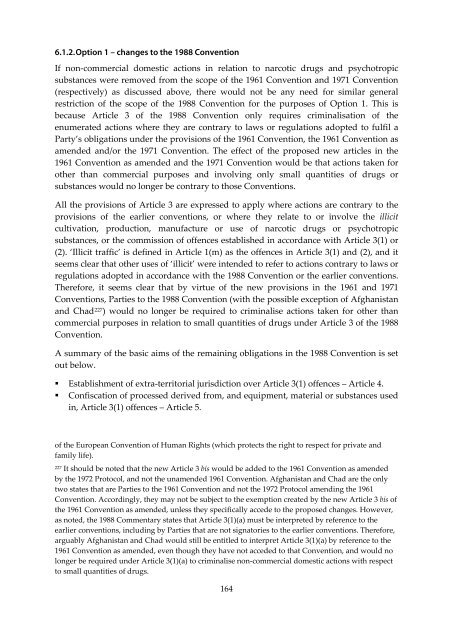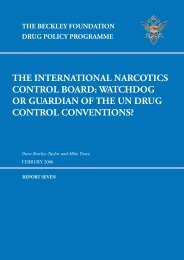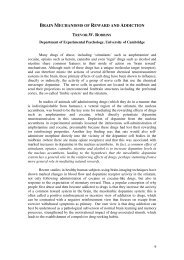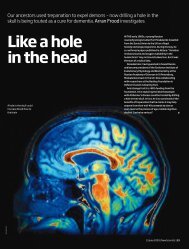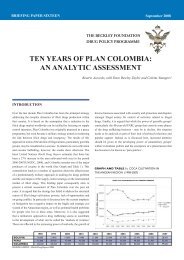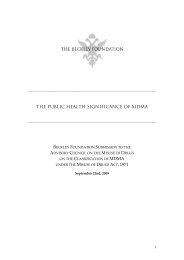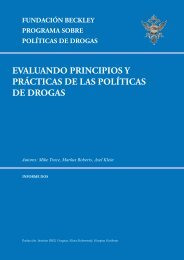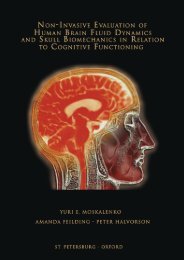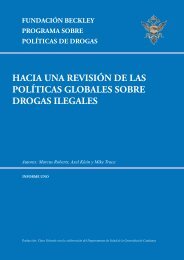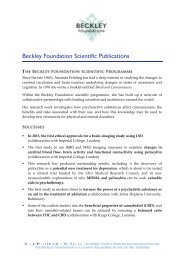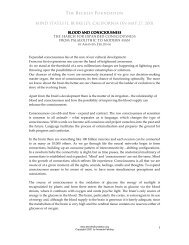roadmaps to reforming the un drug conventions - Beckley Foundation
roadmaps to reforming the un drug conventions - Beckley Foundation
roadmaps to reforming the un drug conventions - Beckley Foundation
You also want an ePaper? Increase the reach of your titles
YUMPU automatically turns print PDFs into web optimized ePapers that Google loves.
6.1.2. Option 1 – changes <strong>to</strong> <strong>the</strong> 1988 ConventionIf non-commercial domestic actions in relation <strong>to</strong> narcotic <strong>drug</strong>s and psychotropicsubstances were removed from <strong>the</strong> scope of <strong>the</strong> 1961 Convention and 1971 Convention(respectively) as discussed above, <strong>the</strong>re would not be any need for similar generalrestriction of <strong>the</strong> scope of <strong>the</strong> 1988 Convention for <strong>the</strong> purposes of Option 1. This isbecause Article 3 of <strong>the</strong> 1988 Convention only requires criminalisation of <strong>the</strong>enumerated actions where <strong>the</strong>y are contrary <strong>to</strong> laws or regulations adopted <strong>to</strong> fulfil aParty’s obligations <strong>un</strong>der <strong>the</strong> provisions of <strong>the</strong> 1961 Convention, <strong>the</strong> 1961 Convention asamended and/or <strong>the</strong> 1971 Convention. The effect of <strong>the</strong> proposed new articles in <strong>the</strong>1961 Convention as amended and <strong>the</strong> 1971 Convention would be that actions taken foro<strong>the</strong>r than commercial purposes and involving only small quantities of <strong>drug</strong>s orsubstances would no longer be contrary <strong>to</strong> those Conventions.All <strong>the</strong> provisions of Article 3 are expressed <strong>to</strong> apply where actions are contrary <strong>to</strong> <strong>the</strong>provisions of <strong>the</strong> earlier <strong>conventions</strong>, or where <strong>the</strong>y relate <strong>to</strong> or involve <strong>the</strong> illicitcultivation, production, manufacture or use of narcotic <strong>drug</strong>s or psychotropicsubstances, or <strong>the</strong> commission of offences established in accordance with Article 3(1) or(2). ‘Illicit traffic’ is defined in Article 1(m) as <strong>the</strong> offences in Article 3(1) and (2), and itseems clear that o<strong>the</strong>r uses of ‘illicit’ were intended <strong>to</strong> refer <strong>to</strong> actions contrary <strong>to</strong> laws orregulations adopted in accordance with <strong>the</strong> 1988 Convention or <strong>the</strong> earlier <strong>conventions</strong>.Therefore, it seems clear that by virtue of <strong>the</strong> new provisions in <strong>the</strong> 1961 and 1971Conventions, Parties <strong>to</strong> <strong>the</strong> 1988 Convention (with <strong>the</strong> possible exception of Afghanistanand Chad 227 ) would no longer be required <strong>to</strong> criminalise actions taken for o<strong>the</strong>r thancommercial purposes in relation <strong>to</strong> small quantities of <strong>drug</strong>s <strong>un</strong>der Article 3 of <strong>the</strong> 1988Convention.A summary of <strong>the</strong> basic aims of <strong>the</strong> remaining obligations in <strong>the</strong> 1988 Convention is se<strong>to</strong>ut below.• Establishment of extra-terri<strong>to</strong>rial jurisdiction over Article 3(1) offences – Article 4.• Confiscation of processed derived from, and equipment, material or substances usedin, Article 3(1) offences – Article 5.of <strong>the</strong> European Convention of Human Rights (which protects <strong>the</strong> right <strong>to</strong> respect for private andfamily life).227It should be noted that <strong>the</strong> new Article 3 bis would be added <strong>to</strong> <strong>the</strong> 1961 Convention as amendedby <strong>the</strong> 1972 Pro<strong>to</strong>col, and not <strong>the</strong> <strong>un</strong>amended 1961 Convention. Afghanistan and Chad are <strong>the</strong> onlytwo states that are Parties <strong>to</strong> <strong>the</strong> 1961 Convention and not <strong>the</strong> 1972 Pro<strong>to</strong>col amending <strong>the</strong> 1961Convention. Accordingly, <strong>the</strong>y may not be subject <strong>to</strong> <strong>the</strong> exemption created by <strong>the</strong> new Article 3 bis of<strong>the</strong> 1961 Convention as amended, <strong>un</strong>less <strong>the</strong>y specifically accede <strong>to</strong> <strong>the</strong> proposed changes. However,as noted, <strong>the</strong> 1988 Commentary states that Article 3(1)(a) must be interpreted by reference <strong>to</strong> <strong>the</strong>earlier <strong>conventions</strong>, including by Parties that are not signa<strong>to</strong>ries <strong>to</strong> <strong>the</strong> earlier <strong>conventions</strong>. Therefore,arguably Afghanistan and Chad would still be entitled <strong>to</strong> interpret Article 3(1)(a) by reference <strong>to</strong> <strong>the</strong>1961 Convention as amended, even though <strong>the</strong>y have not acceded <strong>to</strong> that Convention, and would nolonger be required <strong>un</strong>der Article 3(1)(a) <strong>to</strong> criminalise non-commercial domestic actions with respect<strong>to</strong> small quantities of <strong>drug</strong>s.164


